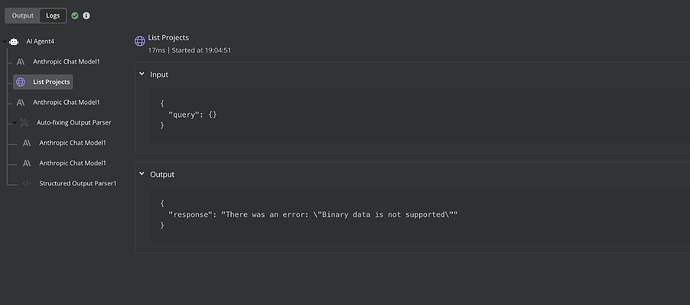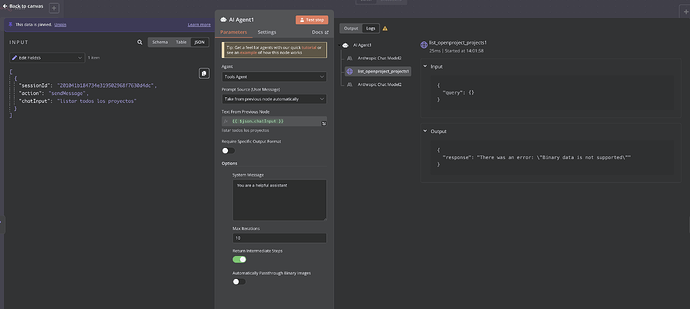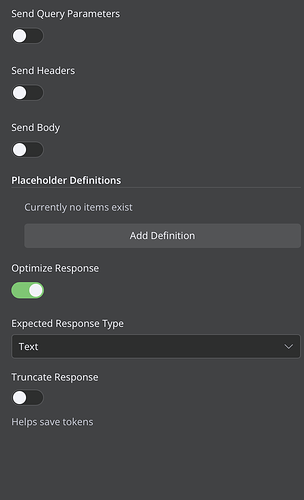May thanks Ria for the explanation and the POC.
Let me rephrase everything since, as you mentioned, I have now switched to using an HTTP REQUEST TOOL. Here’s the flow:
The flow is very simple. Based on a chatInput request to list projects, the AI Agent1 processes it, identifying that the task can be performed using the TOOL “list_openproject_projects1” and executes it. The GET request has been tested with POSTMAN and executes correctly. During its execution in the flow, however, the AGENT receives a response from the subnode indicating that “Binary data is not supported”.
ACTUAL FLOW:
ERROR screen capture:
Execution of the flow screen capture:
So, I know I can work around this by calling another workflow and managing it from there using a standard HTTP node, etc. The point here is that I’d like to understand why the response is labeled as binary data not supported, even though the same GET request in POSTMAN or in a standard HTTP node returns JSON.
This is the answer you should receive:
[
{
"data": "{"_type":"Collection","total":2,"count":2,"pageSize":20,"offset":1,"_embedded":{"elements":[{"_type":"Project","id":2,"identifier":"your-scrum-project","name":"Scrum project","active":true,"public":true,"description":{"format":"markdown","raw":"This is a short summary of the goals of this demo Scrum project.","html":"<p class=\"op-uc-p\">This is a short summary of the goals of this demo Scrum project.</p>"},"createdAt":"2024-12-21T14:59:55.856Z","updatedAt":"2024-12-21T14:59:55.856Z","statusExplanation":{"format":"markdown","raw":"All tasks are on schedule. The people involved know their tasks. The system is completely set up.","html":"<p class=\"op-uc-p\">All tasks are on schedule. The people involved know their tasks. The system is completely set up.</p>"},"_links":{"self":{"href":"/api/v3/projects/2","title":"Scrum project"},"createWorkPackage":{"href":"/api/v3/projects/2/work_packages/form","method":"post"},"createWorkPackageImmediately":{"href":"/api/v3/projects/2/work_packages","method":"post"},"workPackages":{"href":"/api/v3/projects/2/work_packages"},"storages":[],"categories":{"href":"/api/v3/projects/2/categories"},"versions":{"href":"/api/v3/projects/2/versions"},"memberships":{"href":"/api/v3/memberships?filters=%5B%7B%22project%22%3A%7B%22operator%22%3A%22%3D%22%2C%22values%22%3A%5B%222%22%5D%7D%7D%5D"},"types":{"href":"/api/v3/projects/2/types"},"update":{"href":"/api/v3/projects/2/form","method":"post"},"updateImmediately":{"href":"/api/v3/projects/2","method":"patch"},"delete":{"href":"/api/v3/projects/2","method":"delete"},"schema":{"href":"/api/v3/projects/schema"},"status":{"href":"/api/v3/project_statuses/on_track","title":"On track"},"ancestors":[],"projectStorages":{"href":"/api/v3/project_storages?filters=%5B%7B%22projectId%22%3A%7B%22operator%22%3A%22%3D%22%2C%22values%22%3A%5B%222%22%5D%7D%7D%5D"},"parent":{"href":null}}},{"_type":"Project","id":1,"identifier":"demo-project","name":"Demo project","active":true,"public":true,"description":{"format":"markdown","raw":"This is a short summary of the goals of this demo project.","html":"<p class=\"op-uc-p\">This is a short summary of the goals of this demo project.</p>"},"createdAt":"2024-12-21T14:59:53.511Z","updatedAt":"2024-12-21T14:59:53.511Z","statusExplanation":{"format":"markdown","raw":"All tasks are on schedule. The people involved know their tasks. The system is completely set up.","html":"<p class=\"op-uc-p\">All tasks are on schedule. The people involved know their tasks. The system is completely set up.</p>"},"_links":{"self":{"href":"/api/v3/projects/1","title":"Demo project"},"createWorkPackage":{"href":"/api/v3/projects/1/work_packages/form","method":"post"},"createWorkPackageImmediately":{"href":"/api/v3/projects/1/work_packages","method":"post"},"workPackages":{"href":"/api/v3/projects/1/work_packages"},"storages":[],"categories":{"href":"/api/v3/projects/1/categories"},"versions":{"href":"/api/v3/projects/1/versions"},"memberships":{"href":"/api/v3/memberships?filters=%5B%7B%22project%22%3A%7B%22operator%22%3A%22%3D%22%2C%22values%22%3A%5B%221%22%5D%7D%7D%5D"},"types":{"href":"/api/v3/projects/1/types"},"update":{"href":"/api/v3/projects/1/form","method":"post"},"updateImmediately":{"href":"/api/v3/projects/1","method":"patch"},"delete":{"href":"/api/v3/projects/1","method":"delete"},"schema":{"href":"/api/v3/projects/schema"},"status":{"href":"/api/v3/project_statuses/on_track","title":"On track"},"ancestors":[],"projectStorages":{"href":"/api/v3/project_storages?filters=%5B%7B%22projectId%22%3A%7B%22operator%22%3A%22%3D%22%2C%22values%22%3A%5B%221%22%5D%7D%7D%5D"},"parent":{"href":null}}}]},"_links":{"self":{"href":"/api/v3/projects?filters=%5B%5D&offset=1&pageSize=20"},"jumpTo":{"href":"/api/v3/projects?filters=%5B%5D&offset=%7Boffset%7D&pageSize=20","templated":true},"changeSize":{"href":"/api/v3/projects?filters=%5B%5D&offset=1&pageSize=%7Bsize%7D","templated":true},"representations":[{"href":"/projects.csv?filters=%5B%5D&offset=1&pageSize=20","identifier":"csv","type":"text/csv","title":"CSV"},{"href":"/projects.xls?filters=%5B%5D&offset=1&pageSize=20","identifier":"xls","type":"application/vnd.ms-excel","title":"XLS"}]}}"
}
]
Thanks for any clarification on this and 
 Merry Christmas!
Merry Christmas! 
 strong text
strong text
![]()





